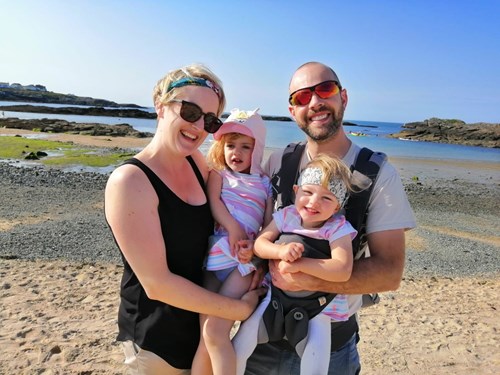Choosing not to hear
Published Date: 12 Nov 2020
It's a Sunday afternoon and my three-year-old daughter Olive has chosen not to wear her cochlear implants all day. Again. Aside from feeling guilty that our amazing Teacher of the Deaf or the implant team might find out, we don’t really mind so much. It’s frustrating when she shouts ‘no!’ and frantically shakes her head as we approach her with them throughout the day, but it’s also her right to choose.
Over dinner we do our best to sign. My husband and I are Level 2 British Sign Language (BSL) and our four-year-old daughter mostly uses made-up signs and over-exaggerated facial expressions… but Olive seems to get what’s happening. We give Olive the chance to sign and vocalise back to us.
Olive is profoundly deaf and has Auditory Neuropathy Spectrum Disorder (ANSD). She was first diagnosed at just two months and we spent a lot of time trying to ‘come to terms’ with her being deaf and what it would mean raising a child with such different life experiences to our own. We were lucky to find a local deaf charity on our doorstep and the families we met through that were instrumental in helping us to understand how deafness wasn’t going to be a barrier for Olive. In fact, it opened our lives to a whole community we had never really been aware of before. We learned about D/deaf and the history of the relationship between hearing and deaf people. We tried to soak in as much as we could - wanting to hear the positive and negative aspects so we could try and make the ‘right decisions’ for our daughter.
We quickly started a Level 1 BSL course and put Olive on the list for cochlear implants, which she got sequentially, at 17 and 26 months. We talked to deaf adults about their experiences and to other families with deafness, whether parents or children, sometimes both. We learned that everyone’s journey is so different. There are no right or wrong answers. The best thing is to find what fits your family.
About a year after Olive’s diagnosis of ANSD, we began to realise she also had quadriplegic cerebral palsy. Being deaf seemed the least of the hurdles she might face. We now know she may never speak (not in a way other people can understand clearly) and may never walk. She finds it hard to move her hands, so signing is not easy for her and we often need context to figure out what she’s telling us. Despite this she’s pretty damn clear at signing ‘chocolate’ or saying ‘pie’ - which seem to be the two most important things in her life…
On days when she decides not to wear her implants, it can be frustrating for us. When we found out that Olive was deaf, we made the decision to all learn BSL and teach her to sign, so that she could make a choice whether to be part of the hearing world or part of the deaf world.
She's now three, so she frequently exercises her choices! It's important to us that Olive is able to communicate and that doesn't always mean speech and hearing. It’s doubly frustrating to me as her mum, being a speech and language therapist and knowing the importance of having consistent access to sound in the early years.
What I’ve come to learn as a parent (not just the parent of a child with additional needs) is it’s important to pick your battles! Olive has very little control over her life and she’s likely to have to rely on others for her basic needs for the rest of her life. If she chooses to have ‘deaf days’ (as we call them) it doesn’t matter. She has ways to communicate with us and that’s what we wanted from the day we started learning to sign. She knows the importance of hearing and listening, for example she enjoys sounds and music because she’s lucky enough to have access to sound when she does wear her implants. Sometimes we wish she wouldn’t have ‘deaf days’ but if I’m honest, I’m a little jealous I can’t have them too.
